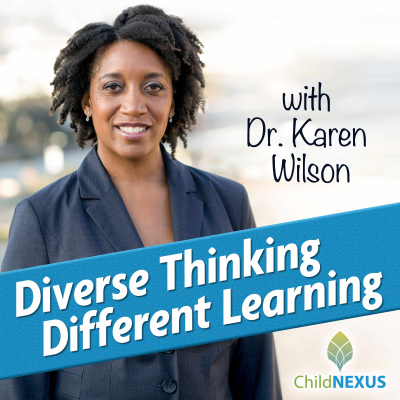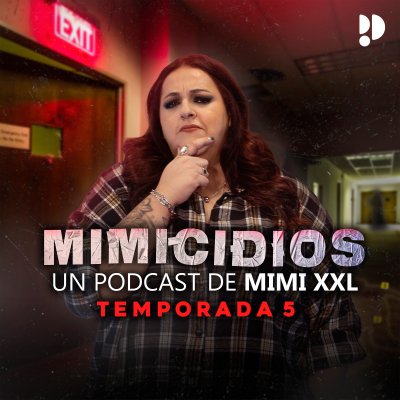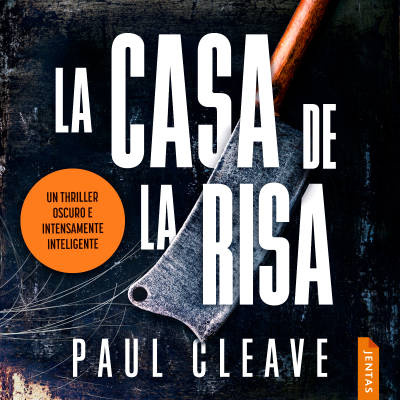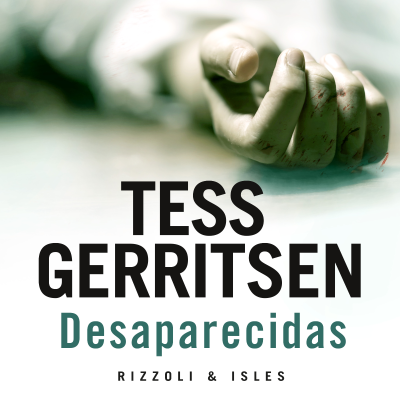
Diverse Thinking Different Learning
Podcast de Karen Wilson
Diverse Thinking · Different Learning, a ChildNEXUS podcast, is hosted by pediatric neuropsychologist, mom of two, and ChildNEXUS founder Dr. Karen Wilson. Each week, Dr. Wilson provides support and guidance for parents raising kids with learning differences. Diverse Thinking · Different Learning features informative and inspiring interviews with top experts in their fields, and gives parents and educators the tools and takeaways they need to better understand neurodivergence, learning disabilities, and youth mental health. This podcast informs offers actionable advice to help diverse learners and children with unique needs reach their fullest potential. Parents of diverse learners or children with mental health challenges can access vetted information and connect with qualified professionals at https://www.childnexus.com/.
Disfruta 30 días gratis
9,99 € / mes después de la prueba.Cancela cuando quieras.
Todos los episodios
222 episodiosWe are excited to welcome back guests Vickie Brett and Amanda Selogie of the Inclusive Education Project [https://www.inclusiveeducationproject.org/]. Vickie Brett is a bilingual attorney who advocates for families' legal rights via the Inclusive Education Project, with a focus on empowering monolingual Spanish-speaking families. Dedicated to supporting clients facing challenges in the education system, she actively contributes pro bono work via the Los Angeles Superior Court and UCI Law School’s Special Education Law Project. Amanda Selogie holds a background in Child and Adolescent Development and law, with a strong focus on civil rights and educational advocacy. Through her work with the Inclusive Education Project and various community roles, she promotes inclusive education and empowers children with disabilities and their families. They join the show for this episode to discuss the current potential threat to educational equity in the United States. Political pressures are mounting to dismantle the Department of Education and roll back diversity, equity, and inclusion (DEI) initiatives, and Amanda and Vickie reveal what’s truly at risk for vulnerable students and their families. The conversation clarifies how efforts to get rid of the Department of Education gain dangerous momentum via legislation tying special education funding to anti-DEI policies, threatening critical services such as mental health programs, independent educational evaluations, and vocational training, all supports that many schools already struggle to maintain. We even highlight real-world impacts, like a San Diego vocational program losing funding despite the clear needs of its students. We also expose some common misconceptions behind “education returning to the states,” showing how dismantling federal oversight damages protections against discrimination. The episode stresses the fact that federal funds remain a lifeline, especially in states reliant on them, and that cuts will only deepen existing inequities, further widening the gap between students who get support and those who don’t. Our conversation also highlights how these changes create anxiety and confusion for families with Individualized Education Plans (IEPs) and 504 accommodations, and Vickie and Amanda warn that insufficient resources push children away from education and toward the prison system. The episode closes with a clear call to action: please make your voice heard to legislators at every level, as this can help impact the future of education. Vickie and Amanda share some practical tools and strategies for advocacy, stressing that the fight to protect equitable education is ongoing and impacts everyone, regardless of whether you live in a blue state or a red state! Show Notes: [3:33] - Republicans seek to dismantle the Department of Education using bills and budget changes, mostly stalled. [6:55] - Vickie asserts that federal oversight is important because local systems often fail, so families must engage more in IEPs. [9:01] - Criticism of the Department ignores state control and risks losing discrimination protections. [11:51] - Amanda points out that many opponents rely on federal education funds, complicating efforts to cut that funding. [13:57] - Proposed funding changes would allow states to pool IDEA money, risking cuts to mental health and after-school programs. [15:21] - Vickie offers a real-life example of San Diego students facing grants being shifted away from vocational programs. [17:12] - COVID grant freezes worsen teacher shortages while a Supreme Court case threatens public education funding. [20:41] - Vickie laments that the preschool-to-prison pipeline worsens. [23:48] - Amanda assures listeners that everything that the Trump administration has done since January has been to benefit the wealthy. [25:56] - Expelling struggling preschoolers worsens inequity, and dismantling DEI erases protections for neurodiverse children. [28:35] - Head Start funding is sadly insufficient and only partially protected. [31:28] - Learn about an app called 5 Calls [https://5calls.org/], which makes it easier than ever to make phone calls to your representatives. [33:46] - Vickie argues that building parent networks and supporting advocacy groups strengthens efforts against education attacks. [36:25] - Amanda adds that laws require inclusive education and that parents need to advocate locally to protect programs. Links and Related Resources: * Episode 90: Why You Need to Review IEP and 504 Plans Over the Summer with Vickie Brett and Amanda Selogie [https://childnexuspodcast.com/ep-90-why-you-need-to-review-iep-and-504-plans-over-the-summer-with-vickie-brett-and-amanda-selogie/] * Episode 157: What Dyslexia Screening in Schools Means for Your Child with Vickie Brett and Amanda Selogie [https://childnexuspodcast.com/ep-157-what-dyslexia-screening-in-schools-means-for-your-child-with-vickie-brett-and-amanda-selogie/] * 5 Calls [https://5calls.org/] * NAACP - “Know the Issues” [https://naacp.org/know-issues] Connect with Us: * Get on our Email List [https://www.childnexus.com/] * Book a Consultation [https://www.childnexus.com/consultation] * Get Support and Connect with a ChildNEXUS Provider [https://www.childnexus.com/find-provider] * Register for Our Self-Paced Mini Courses: Support for Parents Who Have Children with ADHD, Anxiety, or Dyslexia [https://child-nexus.mykajabi.com/parent-mini-courses] Connect with Vickie & Amanda: * Inclusive Education Project - Website [https://www.inclusiveeducationproject.org/] * Inclusive Education Project - Podcast [https://www.inclusiveeducationproject.org/podcast] * Inclusive Education Project - Instagram Page [https://www.instagram.com/inclusiveeducationproject/]
Joining us this week is returning [https://childnexuspodcast.com/ep-83-what-students-with-disabilities-should-do-when-starting-college-with-eric-endlich-ph-d/] guest Eric Endlich, Ph.D [https://www.linkedin.com/in/topcollegeconsultants/]. Dr. Endlich is a clinical psychologist and founder of Top College Consultants® [https://www.topcollegeconsultants.com/], which specializes in guiding neurodivergent students through the college application process. An advocate and expert in the field and a neurodivergent adult himself, he co-teaches a UC Irvine course for educational consultants, manages a large Facebook group for parents of neurodivergent students, and serves on advisory boards related to autism and neurodiversity. Dr. Endlich joins us this week to discuss the far too often overlooked challenges that neurodivergent students face when transitioning from high school to college. While gaining admission is one big challenge, the real challenge is succeeding once on campus, and Dr. Endlich sheds some light on some of the key differences between being college-capable and college-ready, highlighting the fact that students with learning and thinking differences are typically at much higher risk of not completing their degrees. We also explore some practical strategies to help students prepare for the increased independence and self-advocacy required in college life, with topics including building executive functioning skills in high school, the value of gap years, and how parents can gradually transition from being advocates to coaches. Dr. Endlich even talks about how to find the right college fit and make the most of on-campus resources, especially for students needing accommodations and support programs. Whether your teen is just starting high school or gearing up for college in the upcoming fall season, this episode of the podcast truly provides some practical insights into how to foster independence! Show Notes: [2:39] - Dr. Endlich asserts that too many students focus too much on getting into college rather than graduating from it. [4:43] - Success in college requires more than just academic capability; independence and self-management skills are also important. [6:36] - College demands greater self-organization and disability accommodation compared to high school. [8:57] - Dr. Endlich argues that parents should shift from advocating for their child to empowering their independence. [10:26] - Gradually transferring daily responsibilities helps students build independence before college. [13:02] - Taking a gap year can improve college preparedness and help prevent academic burnout. [15:10] - Dr. Endlich adds that gap years can strengthen a student's portfolio and develop valuable life skills. [18:02] - Consider the long-term value of a degree and explore financial aid options. [19:51] - Dr. Endlich points out how skill development can happen during high school, gap years, or throughout college. [22:44] - Even if colleges lack support, external programs can provide assistance and guidance. [25:26] - Visiting various colleges helps students identify their preferences and find the right fit. [28:09] - It's also important to make visits to dining halls and have meetings with support staff, helping to reveal the college's suitability. [31:02] - Even without campus visits, virtual tours and accepted-student events can also offer some valuable insights. [34:58] - Bridge programs help students acclimate to college life before the official start. [36:28] - Dr. Endlich states that carefully managing the application process and having backup plans can help reduce anxiety. Links and Related Resources: * Episode 83: What Students with Disabilities Should Do When Starting College with Eric Endlich, Ph.D [https://childnexuspodcast.com/ep-83-what-students-with-disabilities-should-do-when-starting-college-with-eric-endlich-ph-d/] * Episode 126: Why Self-Awareness and Self-Determination are Important for College Success with Elizabeth Hamblet [https://childnexuspodcast.com/ep-126-why-self-awareness-and-self-determination-are-important-for-college-success-with-elizabeth-hamblet/] * Episode 156: To Test or Not to Test (ACT/SAT) in the Test-Optional Era with Annika Guy [https://childnexuspodcast.com/ep-156-to-test-or-not-to-test-act-sat-in-the-test-optional-era-with-annika-guy/] * Episode 190: Should Your Teen Take a Gap Year? with Julia Rogers [https://childnexuspodcast.com/ep-190-should-your-teen-take-a-gap-year-with-julia-rogers/] * Top College Consultants® - Getting Into College Is the Easy Part [https://www.topcollegeconsultants.com/getting-into-college-is-the-easy-part/] * Top College Consultants® - 6 Reasons to Consider a Gap Year [https://www.topcollegeconsultants.com/6-reasons-to-consider-a-gap-year/] Connect with Us: * Get on our Email List [https://www.childnexus.com/] * Book a Consultation [https://www.childnexus.com/consultation] * Get Support and Connect with a ChildNEXUS Provider [https://www.childnexus.com/find-provider] * Register for Our Self-Paced Mini Courses: Support for Parents Who Have Children with ADHD, Anxiety, or Dyslexia [https://child-nexus.mykajabi.com/parent-mini-courses] Connect with Eric Endlich, Ph.D: * Eric Endlich, Ph.D’s LinkedIn Page [https://www.linkedin.com/in/topcollegeconsultants/] * Top College Consultants® [https://www.topcollegeconsultants.com/] * Email: eric@topcollegeconsultants.com [eric@topcollegeconsultants.com] * Phone: (833) WE-APPLY (toll free)
We warmly welcome Dr. Ryan DeLapp [https://www.linkedin.com/in/ryan-delapp-phd-27237813b/] to Diverse Thinking Different Learning to discuss how to help teens manage and overcome racial stress. Dr. Ryan C.T. DeLapp is a licensed psychologist and the founder of the REACH program at The Ross Center, specializing in helping individuals cope with racial and cultural stress. With more than ten years of research and clinical practice, he has developed evidence-based treatments to build resilience in teens and adults. Dr. DeLapp has also authored more than twenty publications and delivered over 100 presentations on assessing and treating racial and cultural stress. His insights are also compiled in his workbook, Empower Yourself Against Racial and Cultural Stress [https://www.guilford.com/books/Empower-Yourself-Against-Racial-and-Cultural-Stress/Ryan-T-DeLapp/9781462553082/summary]. Dr. DeLapp joins us for this episode to discuss the challenges young people face when coping with racial and cultural stress. Drawing from his experience working with teens and young adults in the Bronx, Dr. DeLapp shares how his REACH program (Racial, Ethnic, and Cultural Healing) was born from a need to address the emotional and psychological impacts of discrimination, particularly during the social upheavals of 2020. Dr. DeLapp breaks down three types of stress: emotional, agency, and identity stress. He explains why it is so crucial to identify and address each one, and he highlights the fact that stressors related to race and culture often go unrecognized, manifesting instead as behavioral issues like school refusal or disengagement. Our conversation also covers practical approaches to helping young people recognize and manage their experiences with cultural stress. Via storytelling and community involvement, Dr. DeLapp’s methods encourage youth and caregivers to build resilience. This episode of the show also stresses the importance of celebrating cultural identity, not just addressing stress, with Dr. DeLapp advocating for community-driven healing and support that go beyond crisis management, highlighting empowerment via knowledge and cultural pride. This episode is essential listening for educators, caregivers, and anyone invested in the mental well-being of young people navigating cultural stress. Show Notes: [2:44] - Dr. Ryan DeLapp [https://www.linkedin.com/in/ryan-delapp-phd-27237813b/] reveals how he created the REACH program [https://www.rosscenter.com/ross_event/racial-ethnic-cultural-healing-high-school-students/] to address cultural stress affecting youth and adults. [5:25] - Dr. DeLapp's book helps young people recognize and manage the impact of racism and cultural stress. [7:34] - Emotional, agency, and identity stress are examined. [10:34] - Dr. DeLapp encourages clinicians to explore cultural stress as a root cause of problematic behaviors. [13:10] - Dr. DeLapp designed the book to empower youth and families to help them articulate racial stress. [14:48] - Inspired by racial coping models, the book guides youth to clarify, cope, and heal effectively. [17:46] - Dr. DeLapp asserts that community healing involves using support networks to take on racial and cultural stress. [19:51] - Bridging generational divides helps adults empathize with youth facing cultural stress. [22:02] - Storytelling leads to solidarity among communities of color by sharing diverse experiences. [25:05] - Dr. DeLapp argues that educators need to reflect on cultural stress to better support their students. [28:48] - Celebrating cultural heritage can ultimately build pride (not just resilience) against discrimination. [30:54] - Thriving means embracing strengths while healing from and coping with cultural stress. Links and Related Resources: * Episode 54: Managing Family Stress and Anxiety with Dr. Stephanie Mihalas [https://childnexuspodcast.com/ep-54-managing-family-stress-and-anxiety-with-dr-stephanie-mihalas/] * Episode 75: How to Raise Justice-Minded Kids with Dr. Traci Baxley [https://childnexuspodcast.com/ep-75-how-to-raise-justice-minded-kids-with-dr-traci-baxley/] * Episode 132: Social Justice: A Framework for Equity in Education with Charles A. Barrett, PhD, NCSP [https://childnexuspodcast.com/ep-132-social-justice-a-framework-for-equity-in-education-with-charles-a-barrett-phd-ncsp/] * Ryan C.T. DeLapp - Empower Yourself Against Racial and Cultural Stress: Using Skills from the REACH Program to Cope, Heal, and Thrive [https://www.guilford.com/books/Empower-Yourself-Against-Racial-and-Cultural-Stress/Ryan-T-DeLapp/9781462553082/summary] Connect with Us: * Get on our Email List [https://www.childnexus.com/] * Book a Consultation [https://www.childnexus.com/consultation] * Get Support and Connect with a ChildNEXUS Provider [https://www.childnexus.com/find-provider] * Register for Our Self-Paced Mini Courses: Support for Parents Who Have Children with ADHD, Anxiety, or Dyslexia [https://child-nexus.mykajabi.com/parent-mini-courses] Connect with Dr. Ryan DeLapp: * The REACH Program [https://www.rosscenter.com/ross_event/racial-ethnic-cultural-healing-high-school-students/] * The Ross Center - Ryan DeLapp, PhD [https://www.rosscenter.com/team/ryan-delapp-phd/] * Dr. Ryan DeLapp’s LinkedIn Page [https://www.linkedin.com/in/ryan-delapp-phd-27237813b/]
We are happy to welcome Dr. Jerome "Jerry" Schultz [https://www.understood.org/en/people/jerome-schultz] to Diverse Thinking Different Learning this week. Dr. Schultz is a clinical neuropsychologist and lecturer at Harvard Medical School with nearly four decades of experience working with children and young adults with learning and behavioral challenges. A former special education teacher and author of Nowhere to Hide [https://www.amazon.com/-/he/Nowhere-Hide-Kids-School-About/dp/0470902981], he has held academic positions at several universities, directed multiple clinics, and maintained a private practice in Wellesley, MA for over three decades. He holds degrees from Ohio State and Boston College and completed a postdoctoral fellowship in pediatric neuropsychology at Tufts Medical Center. Dr. Schultz joins us today to talk about stress - not your everyday kind of frustrations, but the kind that keeps kids awake at night and makes school feel unbearable. Dr. Schultz discusses the significant impact of stress on children’s learning and behavior, revealing the difference between tolerable stress, which is manageable, and toxic stress, which can disrupt a child’s ability to think and learn effectively. We explore how toxic stress can alter brain function, leaving children in a constant state of alert and fear, making everyday tasks like schoolwork feel overwhelming. As we dig into the science behind stress, Dr. Schultz offers some great insights into how to help kids build confidence and resilience, highlighting the importance of framing challenges in a way that helps kids see their own strengths and capabilities. He also discusses how well-meaning encouragement (such as “I know you can do this!”) can backfire by actually adding pressure, and with real-life examples, including strategies for parents and educators, we reveal how small changes in approach (such as helping kids break tasks into manageable pieces or allowing time for a quick break) can lead to a more productive and less stressful learning environment. This episode of the show offers strategies that can help children overcome stress and set them up for long-term success, both in and out of the classroom. Show Notes: [2:37] - Dr. Schultz [https://www.understood.org/en/people/jerome-schultz] explains that stress is a natural response that helps protect us from perceived danger, though it’s evolved. [4:36] - Stress varies between individuals, with toxic stress being long-term and damaging to mental health. [7:07] - Learn how stress impacts learning and how well-meaning encouragement can backfire by increasing pressure on struggling kids. [10:58] - Parents and teachers need practical strategies to support kids experiencing stress. [11:28] - Dr. Schultz discusses how kids' reactions to tasks depend on their belief in success. [14:59] - Rating task difficulty and ability helps kids assess challenges and match them with their capabilities. [16:41] - To recap, Dr. Schultz explains that matching task difficulty and confidence helps kids manage stress and build self-esteem via success. [19:23] - When students feel overwhelmed, breaking tasks into smaller parts can help reset their confidence and mindset. [21:54] - Success enhances brain chemistry, while failure creates a negative mindset that can heighten stress. [23:53] - Dr. Schultz gives an example of coaches using video feedback to correct errors. [25:47] - Dr. Schultz argues that a student's readiness and willingness to complete a task depend on timing and emotional state. [28:31] - Increased pressure on teachers and difficult curricula contribute to stress in both students and educators. [31:06] - Meditation in schools improves behavior and academics, offering students an important time to relax. [33:07] - Dr. Schultz points out that engaging kids in creating their own relaxation strategies helps them more effectively manage stress. Links and Related Resources: * Episode 8: Mindfulness with Dr. Kathleen Carroll-Wray [https://childnexuspodcast.com/mindfulness-with-dr-kathleen-carroll-wray/] * Episode 28: Why We Need to Celebrate and Continue to Build Our Kids’ Resilience [https://childnexuspodcast.com/28-why-we-need-to-celebrate-and-continue-to-build-our-kids-resilience/] * Episode 54: Managing Family Stress and Anxiety with Dr. Stephanie Mihalas [https://childnexuspodcast.com/ep-54-managing-family-stress-and-anxiety-with-dr-stephanie-mihalas/] * Jerome J. Schultz - Nowhere to Hide: Why Kids with ADHD and LD Hate School and What We Can Do About It [https://www.amazon.com/-/he/Nowhere-Hide-Kids-School-About/dp/0470902981] Connect with Us: * Get on our Email List [https://www.childnexus.com/] * Book a Consultation [https://www.childnexus.com/consultation] * Get Support and Connect with a ChildNEXUS Provider [https://www.childnexus.com/find-provider] * Register for Our Self-Paced Mini Courses: Support for Parents Who Have Children with ADHD, Anxiety, or Dyslexia [https://child-nexus.mykajabi.com/parent-mini-courses] Connect with Jerome Schultz, PhD: * Dr. Schultz on Understood [https://www.understood.org/en/people/jerome-schultz] * Dr. Schultz on LinkedIn [https://www.linkedin.com/in/jerome-j-schultz-ph-d-84779913/]
This week on Diverse Thinking Different Learning, we welcome Dr. Aditya Nagrath [https://www.linkedin.com/in/adityanagrath/]. Dr. Nagrath is the founder of Elephant Learning Mathematics Academy [https://www.elephantlearning.com/] and helps students overcome math anxiety, rapidly advancing their skills with just ten minutes of practice a few times a week. He holds a PhD in Mathematics and Computer Sciences and has over three decades of experience as a software engineer, entrepreneur, author, and speaker, working on a wide range of projects from atomic clocks to mobile apps. Dr. Nagrath joins us for this episode to discuss mathematics anxiety - where it comes from, how it’s misunderstood, how to address it and more. A child’s early struggles with math are not always just academic but are also emotional and potentially even life-changing. Dr. Nagrath draws from his rich background in math, computer science, and education to help us break down why so many students begin falling behind in math as early as kindergarten and how early delays often snowball into years of lost confidence, missed opportunities, and career shifts away from math-intensive fields. This isn’t just about numbers or curriculum, however. As Dr. Nagrath explains, math anxiety is often rooted in beliefs such as “I’m not a math person” - beliefs that can trigger lifelong avoidance and reinforce themselves with every uncomfortable encounter with numbers. This is truly a vicious circle that hinders growth and learning well into adulthood. The conversation challenges the common misconception that disliking math is harmless. How early numeracy can actually influence language development, how adult comments can unconsciously pass limiting beliefs to children, and why literacy-focused initiatives may be unintentionally crowding out math readiness. Dr. Nagrath also tells us about Elephant Learning, a tech-based platform that adapts to each student’s comprehension level and uses gamified learning to rebuild mathematical confidence from the ground up. This episode serves as a reminder that math isn’t just a subject but a gateway and that what we do (or, for that matter, don’t do) in the earliest years can shape far more than just test scores. Show Notes: [2:22] - Dr. Aditya Nagrath [https://www.linkedin.com/in/adityanagrath/] explains how working with Elephant Learning [https://www.elephantlearning.com/] revealed that minor complaints often mask deeper math anxiety. [5:05] - The belief that "I'm not a math person" stalls effort and future academic/career opportunities. [7:09] - Similar to AI training, learning depends on the meanings that we assign to experiences and challenges. [9:53] - Hear how Dr. Nagrath defines mathematics anxiety. [12:11] - Dr. Nagrath argues that many students' unresolved early math gaps snowball, derailing STEM careers and impacting the economy. [15:48] - Dr. Nagrath also asserts that Algebra is essential because it introduces written mathematics that are needed for interpreting the modern world. [17:40] - Hear how preschool math practice improves children's future reading, writing, and speaking abilities. [19:41] - Dr. Nagrath uses a basketball analogy to demonstrate that practicing math is essential because no alternative "game" exists. [21:46] - Dr. Nagrath explains that Elephant Learning builds math skills by meeting students at their comprehension level with gamified learning. [24:01] - By mapping standards to age levels, Elephant Learning helps students visualize progress. [27:18] - Because of deeply rooted self-doubt, overcoming math anxiety later in life tends to be more difficult. [28:44] - Dr. Nagrath stresses that problem-solving, like basketball, improves with practice rather than innate intelligence. [31:00] - Modern demands require deeper, language-like mathematical understanding. Links and Related Resources: * Episode 59: What Is Dyscalculia (AKA Math Disorder)? with Monica Grillo [https://childnexuspodcast.com/ep-59-what-is-dyscalculia-aka-math-disorder-with-monica-grillo/] * Episode 60: A Multisensory Intervention for Kids Who Struggle with Math with Adrianne Meldrum [https://childnexuspodcast.com/ep-60-a-multisensory-intervention-for-kids-who-struggle-with-math-with-adrianne-meldrum/] * Elephant Learning [https://www.elephantlearning.com/] * Elephant Learning - K-12 School Solutions [https://schools.elephantlearning.com/] * Treating Mathematics Anxiety: Inclusive Strategies for Working with Students Exhibiting Mathematics Anxiety [https://www.elephantlearning.com/media/treating-mathematics-anxiety-inclusive-strategies-for-working-with-students-exhibiting-mathematics-anxiety] Connect with Us: * Get on our Email List [https://www.childnexus.com/] * Book a Consultation [https://www.childnexus.com/consultation] * Get Support and Connect with a ChildNEXUS Provider [https://www.childnexus.com/find-provider] * Register for Our Self-Paced Mini Courses: Support for Parents Who Have Children with ADHD, Anxiety, or Dyslexia [https://child-nexus.mykajabi.com/parent-mini-courses] Connect with Aditya Nagrath, PhD: * Dr. Nagrath’s LinkedIn Profile [https://www.linkedin.com/in/adityanagrath/] * Email: anagrath@elephantheadsoft.com [anagrath@elephantheadsoft.com] * Phone: 303.919.6071
Disfruta 30 días gratis
9,99 € / mes después de la prueba.Cancela cuando quieras.
Podcasts exclusivos
Sin anuncios
Podcast gratuitos
Audiolibros
100 horas / mes

































